| Andrew Neill |
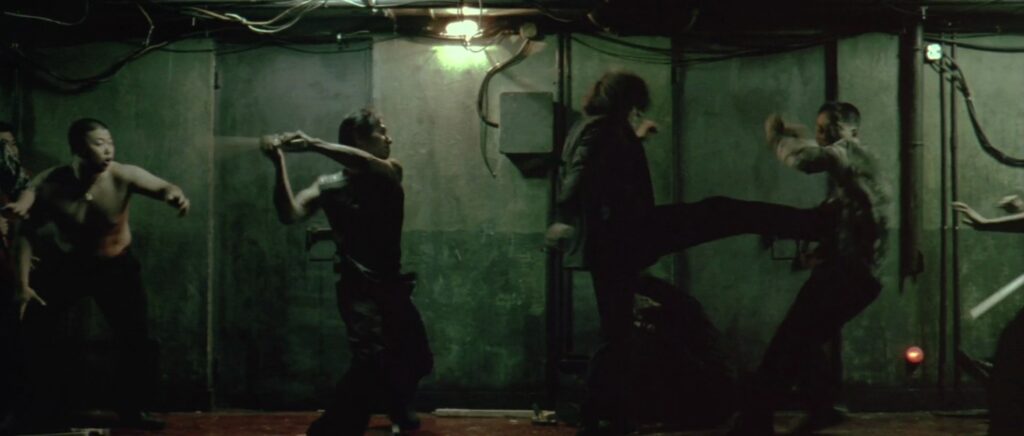
Oldboy plays at the Trylon Cinema from Sunday, July 21st, through Tuesday, July 23rd. Visit trylon.org for tickets and more information.
With the Trylon screening Oldboy this week, I got to thinking about a new subgenre with a unique shade of ugly that’s been taking shape. Only in recent years has it emerged fully formed, given dimension in light of a heinous online subculture. Members of this cinematic cohort stew in a lonely pot of aggrieved alienation and boil over with gut-wrenching violence, like a swift hammer blow to the head. These films often arrive into the culture amid a storm of accusations claiming they are misguided, dangerous, or just outright stupid.
The subgenre’s name is Edgelord Cinema. This beginner’s guide is here to walk you through ten milestone entries in this most twisted of canons, including Director Park Chan-wook’s nightmarish rampage of revenge.
An edgelord refers to someone (usually a poster on the internet) who expresses dark, nihilistic opinions or makes taboo statements with the intent of shocking or offending. The films in this guide encompass works by, for, about, or adopted by edgelords. They sit precariously on that murky continuum of depiction and endorsement, waffling between indulging the worst impulses and interrogating them. Even if self-critique exists in the work, edgelords are prone to overlooking the nuance if a surface-level reading fits their bleak worldview. This guide is going to attempt to separate the art from that audience to see if the films have anything to offer other than freakin’ it for the lulz. Because even the worst, most morally vacant of art gives us that room to contextualize and critique.
Let’s begin.
—
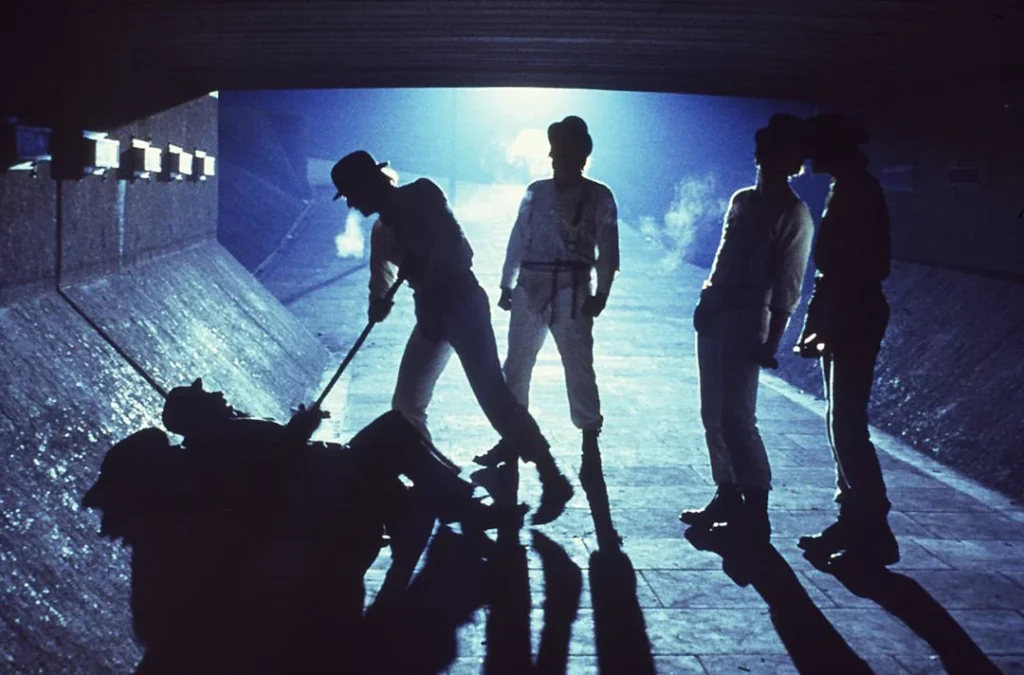
A Clockwork Orange (1971, directed by Stanley Kubrick)
This dystopian tale charts the fall and rise of Alex DeLarge, an English teen whose nightly rituals include rape and “ultra-violence” until he’s arrested and selected to go through an experimental treatment to cure his antisocial behavior.
This is the urtext of the Edgelord Canon, with Alex as the primordial edgelord hero. His smug, shit-eating smirk might as well be the face of the movement; he leers at the world with a perverted entitlement. An early scene that features him terrorizing a suburban couple while he croons “Singin’ in the Rain” is a watershed moment, deploying a vicious irony that we’ll see echoed throughout this canon. The crumbling near-future setting is further kindling for the edgelord fire, as it fuels a “we live in a society” worldview where all social systems are broken. However, Alex’s journey offers a stark example of how fascism transforms violent thuggery from criminal behavior into a tool of the state.
—

Taxi Driver (1976, directed by Martin Scorsese)
The ultimate portrait of urban isolation follows Travis Bickle, a young Vietnam vet who drives a cab at night through grungy ‘70s NYC as he spirals into mania after being dumped by a pretty political aide.
Travis represents a different breed of edgelord hero: the incel. He’s a young, straight, white man who retreats inward when the world doesn’t offer what he thinks he deserves. His alienation and rage build and build until he releases them in a spree shooting–a maddening, far-too-familiar story to us here in America today. This recognizable reality preserves the film’s power almost 50 years after its release. Unlike other films on this list, Taxi Driver never loses sight of Travis as a human being; that familiarity makes his actions so much more horrific.
—
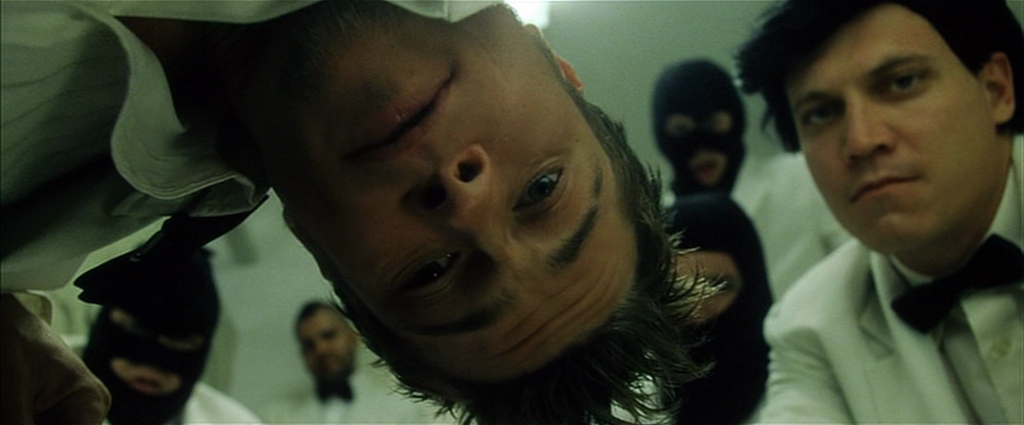
Fight Club (1999, directed by David Fincher)
Feeling dissatisfied with life and numb to the world, a nameless corporate drone and his spiky-haired friend (who rocks an immaculately thrifted wardrobe) start a fight club to release their pent-up frustration until it transforms into an interstate terrorist organization.
We’re skipping ahead to the 90s to pay a visit to Tyler Durden, patron saint of the edgelord. Durden’s persistent sermons of anti-consumerism, anti-capitalism, and nihilism are catchy earworms for the disenfranchised. Quotes from this movie have been taken at face value and proliferated ad nauseum; “special snowflake,” for example, remains an epithet lobbed by edgelords and the alt-right to troll anyone on the left. Fight Club is without a doubt the most misinterpreted entry in this canon, but that’s largely due to its mixed success as a satire. For as absurd as its characters behave, it has a sicko je ne sais quoi that’s oddly alluring, perhaps because it’s embodied by Brad Pitt at peak hotness.
—
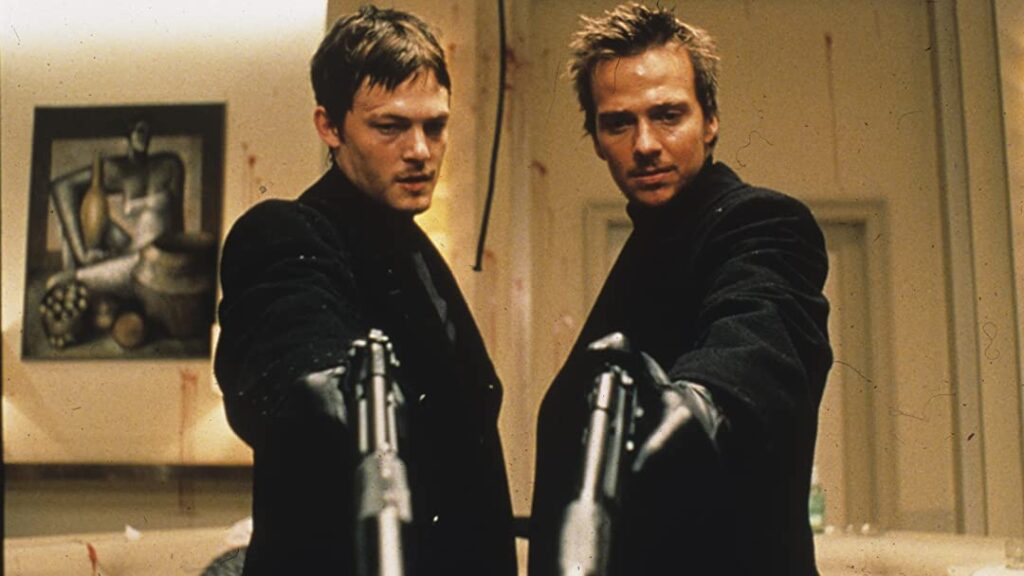
The Boondock Saints (1999, directed by Troy Duffy)
Two Boston townies in matching outfits begin to gun down anyone they deem undesirable, as an eccentric federal agent with a great head of hair closes in on them.
In the wake of Pulp Fiction came a host of copycats who aped the attitude, style, and violence of Quentin Tarantino’s film without the postmodern twist. Enter the peak of this misguided trend: Troy Duffy’s The Boondock Saints. This Christian-tinged crusade of righteous violence is a power trip fantasy for the edgelord, and ever-so-slightly subversive for how the Saints’ brand of vigilante justice is admired by cops. Unfortunately, any subversion is undermined by Duffy the edgelord auteur, who clearly believes in its batshit insane outlook on justice.
—
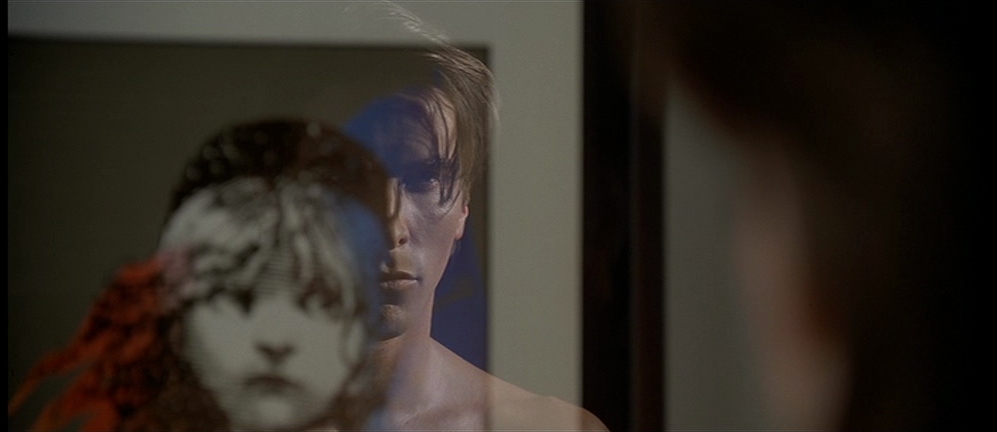
American Psycho (2000, directed by Mary Harron)
During the Reagan 80s, Patrick Bateman, a psychopathic investment banker who may or may not be committing horrific murders in his sterile, Park-adjacent apartment, struggles to emulate the social mores of upper-crust society while fighting against his own violent delusions.
Bateman epitomizes a contradictory edgelord trait. He hates everyone in the world he inhabits, but he wants so desperately to fit in. Anything outside the narrow perimeter of his orbit disgusts him, and oh lordy does he hate women! However, the queer authorship of American Psycho—including Director Mary Harron and author of the source novel Bret Easton Ellis—subverts any surface-level readings. Under Harron’s direction, these wealthy, white elites act more like aliens than human beings. Bateman and his cohort’s myopic obsessions with things like restaurant reservations and business cards cross over into the realm of absurdist comedy. Now if you’ll excuse me, I have to return some video tapes.
—
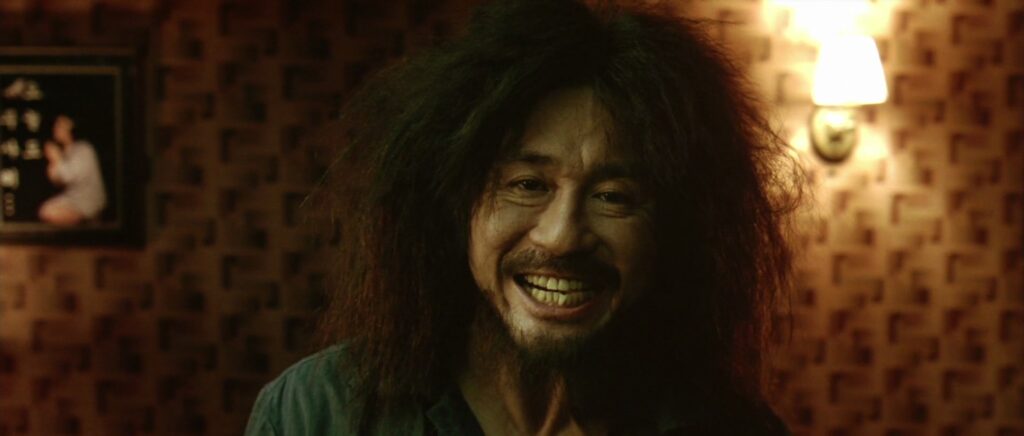
Oldboy (2003, directed by Park Chan-wook)
After fifteen years of imprisonment in a hotel room for no known reason, Oh Dae-su is released and begins a hell-bent search to discover who locked him up and why.
We’ve reached the film that inspired this whole guide. While otherwise thoughtful in his filmic provocations, Director Park plunged deeply into edgelord waters with this work of extreme cinema.
Many of us were lured in by the now infamous, long-take hallway brawl, in which Oh Dae-su sloppily bludgeons a host of enemies with a hammer. This scene has gone on to inspire myriad copycats, including edgelord-adjacent stuff like Atomic Blonde, Guardians of the Galaxy Vol. 3, and Netflix’s Daredevil series. But unlike those and some other edgelord films we’re about to get to, this is no superhero story. The hammer fight is as far into power trip fantasy as Park goes.
Instead, his dogged aim is to disgust the viewer, giving into the edgelord’s compulsion to shock. The film continues to be passed from viewer to viewer (perhaps by way of a Tartan Asia Extreme DVD) like a dare: can you stomach its depravity? Close-up dental mutilation. Real, on-camera consumption of a live squid. Sexual relations between… Well, let’s not spoil everything. In Oldboy, getting down with the sickness is the essential substance.
—
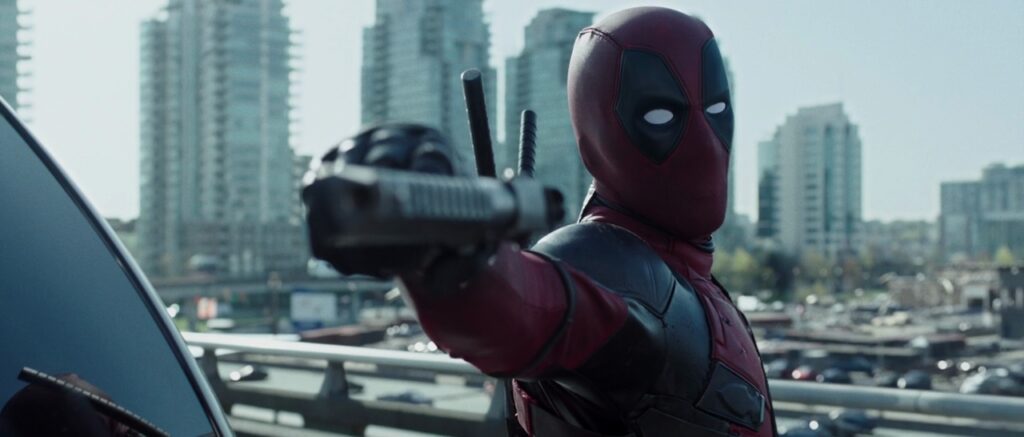
Deadpool (2016, directed by Tim Miller)
After an experimental procedure transforms him into a human tumor with regenerative superpowers, the so-called “merc with a mouth” Wade Wilson adopts the moniker Deadpool and cuts a bloody path in pursuit of revenge, cracking wise all along the way.
Even the Edgelord Canon can’t escape modern Hollywood’s fixation on intellectual property (IP), particularly comic books, despite the edgelord’s anti-capitalist bent. (Gasp! Is your humble narrator suggesting hypocrisy?) Deadpool is the edgelord superhero, in that he’s literally a superhuman edgelord. His abilities grant him immortality, which enables him to live out an edgelord fantasy: he can merc fools with the greatest of ease while dropping fourth-wall-breaking jokes laden with gleeful profanity. Any virtue signaling of heroism is there to appease the “normies.”
—
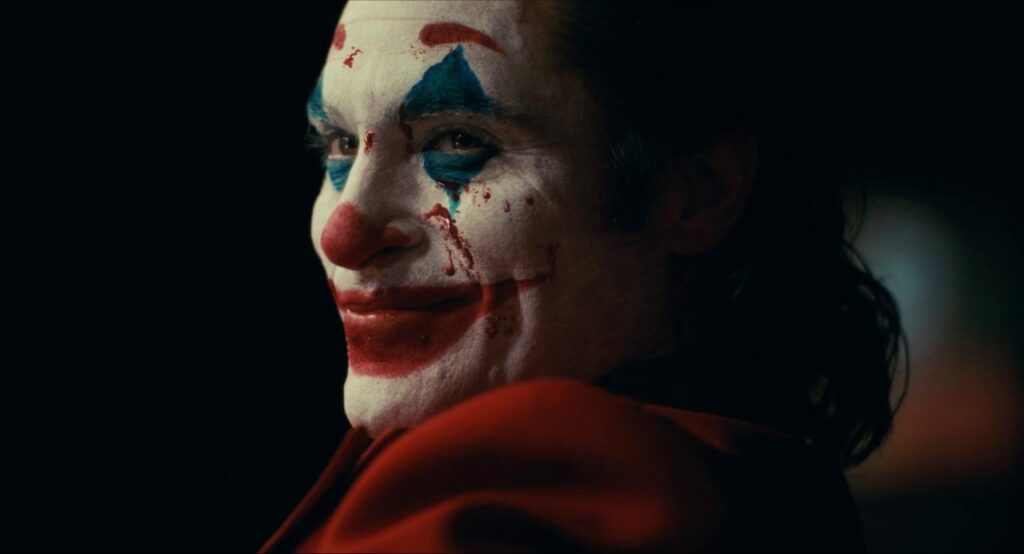
Joker (2019, directed by Todd Phillips)
In a dystopian Gotham City, Arthur Fleck rises up from failed comedian and compulsive laughing weirdo to clown prince of crime, inspiring a violent uprising against the wealthy elite.
Todd Phillips, who helmed Joker, is an edgelord director who deals in performative provocation. After kicking off his career with a documentary on shit-slinging punk extremist GG Allin, he achieved success making raunchy comedies before parlaying it into Joker, a ‘70s New Hollywood pastiche hidden not-so-subtly in a Trojan Horse of comic book IP. Joker is the 21st Century culmination of the Edgelord Canon. It’s a grab bag of edgelord tropes—urban alienation, decaying social systems, “eat the rich” sloganeering—but without a coherent or recognizably human point of view like its Scorsese-made influences. Phillips has never had anything to say; he’s only out to embrace the darkness.
—
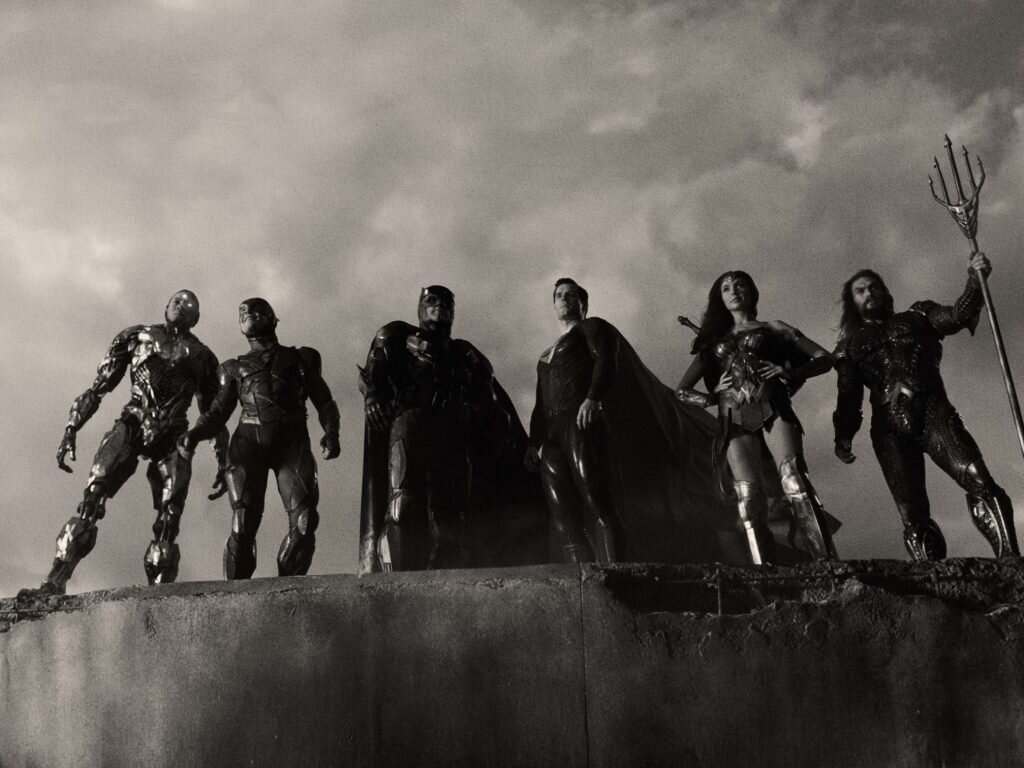
Zack Snyder’s Justice League (2021, directed by Zack Snyder)
A coterie of DC Comics heroes, including Batman, Wonder Woman, and Aquaman must resurrect Superman to protect the Earth from a powerful, extradimensional foe.
If there’s a modern director whose work most embodies the edgelord ideal, it’s Zack Snyder. They’ve hand-selected him as their champion. His fetishization of violence and masculinity feeds their fantasies. His insistence on grounding superhero stories in a bleak world with suffocating seriousness justifies their outlook. After Snyder stepped away during post-production on Justice League, Warner Bros. released an abridged two-hour cut in 2017 interspliced with Joss Whedon-directed reshoots. The edgelords revolted. “Release the Snyder Cut!” was their cry. Their incessant, online bullying drove Warner Bros. into coughing up an additional $70 million so Snyder could craft this interminable 242-minute, black-and-white version. If you value the transitory nature of life, watch the shorter one.
—
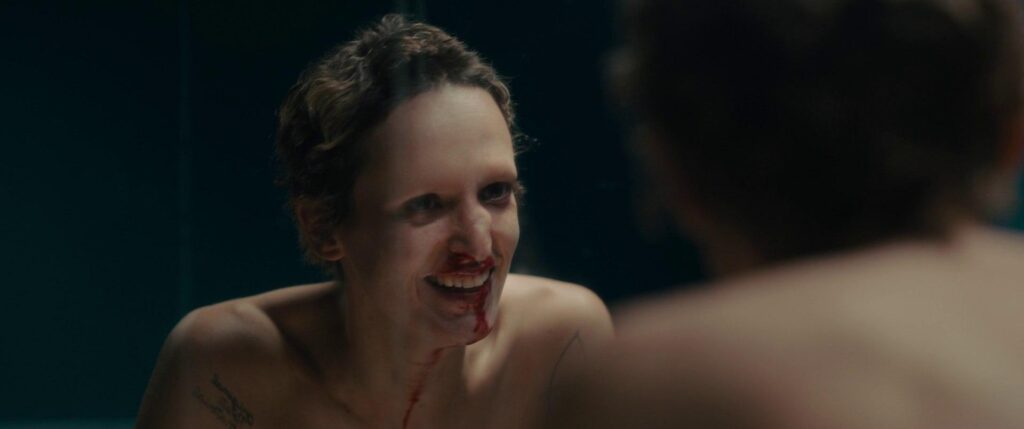
Titane (2021, directed by Julia Ducournau)
Alexia, a serial killer with a titanium plate in her head, fucks a car and becomes pregnant with a metallic car baby. To avoid arrest for a murder spree, she represses her pregnancy and begins to impersonate the missing son of a ‘roided up fire captain.
Let’s go out with a little hope, even if this movie goes so hard it almost drove your humble narrator into a panic attack. Titane follows in the line of New French Extremity, a movement that reflects edgelord themes, but the film recontextualizes them by removing the straight-white-male-ness of it all. The film may deal in wild violence and simmer with anger, but it eschews the aggrieved entitlement of the edgelord hero and refuses to submit to any objectification of its lead. In fact, the femininity of its rage and take on body horror are likely enough to make the edgelord go pale.
—

Further viewing
Finished with the beginner’s stuff and looking to dive deeper into the Edgelord Canon? (You sicko…) Here are some more edgy classics to satisfy your hunger for the depraved:
Falling Down (1993, directed by Joel Schumacher)
The most mainstream gay director of the 90s makes a film about what happens when the straightest, whitest man in the world snaps.
Irreversible (2002, directed by Gaspar Noé)
France’s most well-established edgelord director offers a reverse-chronological take on the rape-revenge tale.
Underworld (2003, directed by Len Wiseman)
What if The Matrix but you throw out any interesting ideas and it’s only the guns and leather? An edgelord wet dream.
Antichrist (2009, directed by Lars von Trier)
CHAOS REIGNS in this disturbing, domestic hellscape by Euro-edgelord von Trier.
A Serbian Film (2010, directed by Srđan Spasojević)
The only way to see this Euro-exploitation film is for an edgelord to dare you to watch it, and I’ve never had the pleasure.
I Saw the Devil (2010, directed by Kim Jee-woon)
After Park, Kim is the next name in South Korean Extreme Cinema, and this bonkers cat-and-mouse game between a federal agent and serial killer goes very, very hard.
Super (2010, directed by James Gunn)
Gunn may be the celebrated director of the Guardians of the Galaxy movies and now the co-CEO of DC Studios, but he’s always been an edgelord. This wicked indie was bizarrely his superhero calling card.
Drive (2011, directed by Nicolas Winding Refn)
Refn is the guy if you’ve got a fetish for violence, and this is his biggest hit. It stars a scorpion-embroidered, members-only jacket with Ryan Gosling inside it.
Bodies Bodies Bodies (2022, directed by Halina Reijn)
A hurricane party full of Zoomers gets paranoid and violent really quickly in this edgy whodunnit that offers another feminine spin on the subgenre.
AGGRO DR1FT (2024, directed by Harmony Korine)
Korine literally started a design collective called EDGLRD (pronounced “edgelord”), which released this hallucinatory experimental feature shot entirely in thermal imaging.
Edited by Olga Tchepikova-Treon
